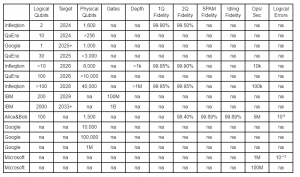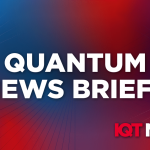The Quantum Roadmap Battle of Logical Qubits

Over the past few months, several quantum computing companies have published their own roadmap involving logical qubits. Current quantum computers use physical qubits, which are error-prone and short-lived. But encoding multiple physical qubits as a single logical qubit results in a qubit with a lower error rate and a longer lifespan. Logical qubits are generally accepted to be necessary to achieve fault-tolerant quantum computing.
The contestants currently battling it out in the logical qubit space – in the chronological order of their announcements – are IBM Quantum, QuEra Computing, Alice & Bob, and Infleqtion. Google and Microsoft are also in the ring with undated announcements.
IBM Quantum
Back on December 4, 2023, IBM Quantum did not make headlines for a roadmap to logical qubits. That may be due, in part, to other announcements they made at IBM Quantum Summit 2023. But it may also be due, in part, to the fact that they aren’t using the term “logical qubits.” Because the term has to be defined, as oversimplified above, they are focusing on simply providing the number of qubits you can use and the number of gates you can execute. At 15,000 gates per circuit, the number of qubits being referenced transitions from physical qubits to logical qubits.
QuEra Computing
Then on January 9, 2024, QuEra Computing started the current trend of using the term “logical qubits” with the announcement of their 3-year roadmap. They have deliverables scheduled for each year of the roadmap. They view this as a transition period into an “era of logical qubits,” in which the count of logical qubits is beyond the ability of classical computers to simulate. Their roadmap is the earliest to 100 logical qubits.
Alice & Bob
Then on January 23, 2024, Alice & Bob teased a roadmap, although a formal roadmap has not yet been published. Their emphasis is on reducing the number of physical qubits that will be required per logical qubit. The target fidelities, operations per second, and logical error rate come from this paper.
Infleqtion
Most recently, on February 8, 2024, Infleqtion announced a 5-year roadmap with deliverables scheduled in 2-year intervals starting this year. Their roadmap includes target gate fidelities and circuit depths.
On an undated page, Google has published a roadmap leading to only one logical qubit, however they identify three milestones beyond that. The roadmap culminates in one million physical qubits and an error-corrected quantum computer, but without specifying the number of logical qubits.
Microsoft
Microsoft also has an undated roadmap. It shows six phases of development with a focus on operations per second and logical error rate.
Comparisons of Each Roadmap
To make the comparisons more challenging, not every roadmap contains the same information. The following table consolidates the information that has been provided thus far and sorts the deliverables chronologically.

Roadmap table comparing the many different companies and their logical qubit systems.
Honorable Mentions
Although Quantinuum has neither published a roadmap nor teased a roadmap, they have been using small numbers of logical qubits to execute algorithms, specifically the calculation of molecular hydrogen’s ground state energy and the solution of a single-bit addition problem, the latter in partnership with QuTech and the University of Stuttgart. Amazon Web Services has also not published a roadmap, but they have announced that they are developing an error-corrected quantum computer.
Conclusion: Each Roadmap is Different
The only non-controversial analysis might be that there is no consensus as to what the most important metrics are. The data in the table is all sourced directly from the respective providers, allowing you to see what each provider has chosen to make publicly available. Some of the data allows speculation as to some of the “na” values, but those values, for whatever reasons, have not been definitively provided. Furthermore, providing speculation can run contrary to the messaging of a provider, which deliberately wants to downplay a certain metric, deeming it unimportant and wanting to stress other metrics.
One use of the table, besides comparison and speculation, is as a check on claims of usefulness and “quantum advantage.” If someone claims regarding the year 202N, that claim has to be supported by the hardware that we hope to have available in the year 202N. None of these roadmaps, for example, include breaking Internet encryption. That said, three companies are in writing, projecting at least 100 error-corrected qubits before the end of this decade. We can use this table with resource estimation to determine what we can realistically hope to run within the next few years as we follow each roadmap.
Brian N. Siegelwax is an independent Quantum Algorithm Designer and a freelance writer for Inside Quantum Technology. He is known for his contributions to the field of quantum computing, particularly in the design of quantum algorithms. He has evaluated numerous quantum computing frameworks, platforms, and utilities and has shared his insights and findings through his writings. Siegelwax is also an author and has written books such as “Dungeons & Qubits” and “Choose Your Own Quantum Adventure”. He regularly writes on Medium about various topics related to quantum computing. His work includes practical applications of quantum computing, reviews of quantum computing products, and discussions on quantum computing concepts.


















